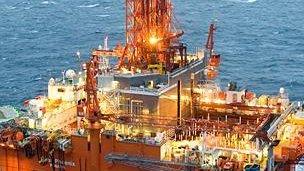North Sea oil and gas revenue projections lowered
- Published

The budgetary watchdog said the key driver for its new forecast was lower projected oil and gas prices
Future North Sea oil and gas revenues may be much lower than previously predicted, according to the UK's budgetary watchdog.
The Office for Budget Responsibility (OBR) has projected receipts will be about 0.05% of GDP by 2040-41.
That is about half the level it projected in last year's report.
The Scottish government said Scotland was not "overly reliant" on North Sea revenues.
But Scottish Secretary Michael Moore claimed the projections showed the "huge long-term consequences" of Scotland leaving the UK.
The OBR identified lower projected oil and gas prices as the key driver for the reduced figures given this year.
It said: "Our projections for oil and gas prices are also lower than last year...oil prices rise from $95 a barrel in 2016 to $173 a barrel in 2040.
"This compares with a projection in last year's report of a rise from $107 a barrel in 2015, rising to $206 a barrel in 2040."
'Economic levers'
A spokeswoman for the Scottish government said: "With more than half of the value of the North Sea's oil and gas reserves yet to be extracted, 24 billion barrels with a wholesale value of £1.5 trillion, oil and gas will remain an enormous economic resource for decades to come.
"The Scottish government's Oil and Gas Strategy developed in conjunction with industry lays out a plan to help the industry go from strength to strength, and rising capital investment reaching £8.5bn in 2011, expected to rise to £11.5bn in 2012, shows the confidence the industry has in Scotland."
She added that, with independence, the Scottish government would have the economic levers necessary to provide the long term stability and fiscal incentives to maximise production, encourage investment and in turn boost tax revenues.
The spokeswoman added: "This is in contrast to the fiscal instability experienced under the UK government's current system that has been widely criticised by industry.
"Notwithstanding the continuing success of the oil and gas sector, Scotland has a broad tax base and is not overly reliant on North Sea revenues. Even when North Sea revenues fell during the global financial crises Scotland's fiscal position remained stronger than the UK's."
'Long-term consequences'
But Mr Moore said the OBR projections showed the effects of a drop on oil revenues. He also argued that the Scottish government could not ignore the impact of the OBR's halving of its forecast.
"We know it is a volatile commodity," he said.
"That risk is far better handled as part of the wider UK, where oil revenues represent a much smaller part of the economy than they would in a separate Scotland.
"Today's news is another addition to the evidence which shows the huge long-term consequences of leaving the UK.
"We are all optimistic about the future of the North Sea but the Scottish government should not be blase about the reality of its post-independence economics which rely on these revenues."
'Significant change'
Labour's Shadow Scottish Secretary, Margaret Curran, said the "significant change" in projection showed again how volatile commodity markets were.
"The oil and gas sector is very important, but production goes up and down, prices go up and down, and so it is foolish to base our whole economy on this alone," she said.
"It is much more sensible for Scotland to be part of a balanced economic mix rather than being so heavily reliant on just one sector.
"The report makes the case for the partnership of Scotland working with our neighbours, not in competition with them."
She added: "Being part of the UK club means there is a benefit for Scotland where together we share risks and resources."
The Scottish Conservatives finance spokesman Gavin Brown said: "The SNP's strategy of a separate Scotland being so reliant on oil and gas is a risky and ill-judged approach.
"As part of the UK this uncertainty can be endured, but a separate Scotland dependent on oil money would find it far more difficult."
- Published9 May 2012
- Published8 May 2012
- Published23 February 2012
- Published15 February 2012